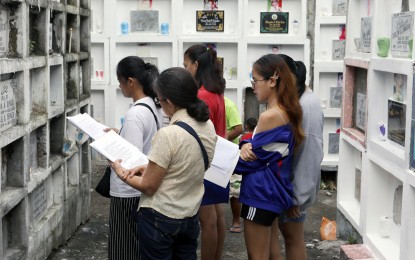
PRAYERS FOR THE DEPARTED. Visitors to the Bagbag Cemetery in Quezon City say prayers for their departed loved ones on Wednesday (Nov. 1, 2023). Catholic priest Fr. Fernando Egargo said it is important to pray for the souls for the forgiveness of their sins. (PNA photo by Joey O. Razon)
MANILA – Remembering and celebrating the life of a departed loved one is as important as praying for their souls, in the hope that they gain eternal life with God.
Fr. Fernando Egargo, a professor of Theology and Philosophy at St. Johns University in New York, said the tradition of commemorating the life of a departed goes beyond the simple act of visiting their tombs.
He said it is rooted in the belief in resurrection and life beyond death.
In an interview with the Philippine News Agency, Egargo said the observance of All Saints' and All Souls' Days is particularly strong in the Philippines, unlike in other countries.
The priest said it is important to pray for the souls of the departed.
“Sa turo ng simbahan, ang mga kaluluwa na wala pa sa langit ay hindi nila kayang magdasal para sa kanilang sarili, so tayo ang pwedeng magdasal para sa kanila. Kasi naniniwala tayo na mayroong purgatory, na mayroong place na para bang nililinis tayo in the process of purgation kaya purgatory ang tawag. Hopefully 'yung mga panalangin natin para sa kanila ay makalinis sa kanilang mga kaluluwa (According to the teachings of the Church, souls that are not yet in heaven cannot pray for themselves, so we are the ones who can pray for them. We believe that there is a purgatory, that there is a place where we are cleansed in the process of purgation that's why it's called purgatory. Hopefully the prayers for them can help cleanse their souls),” Egargo said.
Roman Catholics believe in resurrection and eternal life, and that life does not simply end when people die.
“That is why visit in the cemetery, 'yung tinatawag minsan natin sa regulation ng simbahan commemoration of the dead, 'yung ating ginugunita ang araw ng mga patay, ito ay tanda ng ating pananampalataya, at tanda ng pag-asa natin sa buhay na walang hanggan (What we call as the commemoration of the dead, when we commemorate the day of the dead, this is a sign of our faith, and symbolizes our hope in the eternal life), faith and hope in the resurrection," he added.
Egargo said this tradition of praying for the souls of the dead has a scriptural basis in the Bible, under 2 Maccabees 12:42, which reads: “Turning to supplication, they prayed that the sinful deed might be fully blotted out. The noble Judas exhorted the people to keep themselves free from sin, for they had seen with their own eyes what had happened because of the sin of those who had fallen.”
Those who pray for the souls in the purgatory on these days may receive plenary indulgence, which according to the Catholic Church, can be gained when praying for the souls between Nov. 1 to Nov. 8, or the traditional Octave of all Saints.
“'Yung plenary indulgence ang turo ng simbahan ay pag nakatanggap tayo niyan, 'yung ating sins, 'yung consequences ng sins natin, 'yung in terms of punishment ay nababawasan o natatanggal, either dito sa mundo, or sa kabilang buhay (Plenary indulgence, according to the teachings of the Church, says that if we receive it, our sins, and all of its consequences, are forgiven, either here or in the afterlife)," he said.
The Vatican website states that evidence exists that back in the second century, Christians prayed for and celebrated the Eucharist for their beloved departed.
In the beginning, they would pray on the third day after burial and the anniversary. Later on, it became customary to pray on the 7th and 30th day after death.
The Vatican said that remembering the dead every Nov. 2 became official in the year 998 when Abbot Odilo of Cluny made it obligatory in all the monasteries subject to him.
In 1915, Pope Benedict XV granted permission to priests to celebrate several Masses on Nov. 2 which are geared toward highlighting the Paschal Mystery, Jesus’ victory over sin and death. (PNA)
